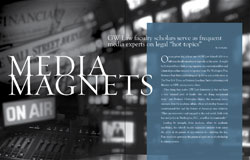Media Magnets
GW Law faculty scholars serve as frequent media experts on legal "hot topics"
On any given day, at least one of GW Law School's 100 or so full-time faculty members is typically in the news. It might be Professor Mary Cheh giving expertise on constitutional law and criminal procedure issues to a reporter from The Washington Post, Professor Paul Butler publishing an Op-Ed on jury nullification in The New York Times, or Professor Jonathan Turley addressing civil liberties on NPR, among many others.
"One thing that makes GW Law distinctive is that we have a very talented pool of faculty who are doing exceptional work," says Professor Christopher Bracey, the incoming senior associate dean for academic affairs, whose scholarship focuses on constitutional law and the history of American race relations. "They are innovative and engaged in the real world, both with law and policy in Washington, D.C., as well as internationally."
Leading by example, from academic affairs to academic excellence, the school's faculty represents interests from across the globe in its pursuit of opportunities for clarifying the law. Four standouts epitomize the practical application of scholarship to current events.
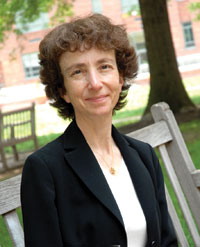 Modern Family Lawyer
Modern Family Lawyer
Naomi Cahn
John Theodore Fey Research Professor of Law
When The New York Times recently profiled a man whose sperm had helped to create 150 children, the reporter called Naomi Cahn, GW's John Theodore Fey Research Professor of Law, who is well known for her work in family law, feminist jurisprudence, and reproductive technology. She shared her expertise on the inherent issues associated with that practice, particularly given the nature of her 2009 book, Test Tube Families: Why the Fertility Market Needs Legal Regulation (NYU Press).
A professor at GW since 1993, Ms. Cahn has defined and redefined the various meanings of family in the new millennium. The New Yorker called her most recent book, Red Families v. Blue Families: Legal Polarization and the Creation of Culture (Oxford University Press, 2010), which she co-authored with University of Missouri at Kansas City Law Professor June Carbone, "a fascinating, groundbreaking look at the ways in which the red versus blue political divide reflects an even deeper divide in family life and sexual values."
Her work extends far beyond the mainstream media. While NPR may be discussing her book Family Classes: Rethinking Contraceptive Choice for its listeners, the Supreme Court of British Columbia is referencing her policy brief Old Lessons for a New World: Applying Adoption Research and Experience to Assisted Reproductive Technology about the need of donor-conceived children to have access to information about their donor(s), which she prepared as a senior fellow for the Evan B. Donaldson Adoption Institute in New York City. "GW has provided me with the opportunity to pursue these fascinating issues and to try to make a difference in the policy world," she says.
Students also routinely consult her when they want to write in these areas as she teaches courses on family law; trusts and estates; and child, family, and state. "I am hoping that people use my research to make decisions about their lives," adds Professor Cahn, who has co-written casebooks on these fields as well.
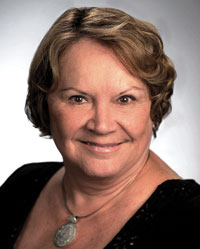 Human Rights Leader
Human Rights Leader
Dinah L. Shelton
Manatt/Ahn Professor of International Law
While teaching international human rights at the University of Strasbourg some years ago, Dinah L. Shelton, GW's Manatt/Ahn Professor of International Law, told a colleague about her impatience with the pace of global change. The colleague pointed at the nearby Strasbourg Cathedral and commented that the legendary structure took many generations to build by history's most gifted craftsmen, many of whom would never see the completed work.
It is that perspective that drives one of the Law School's most recognized diplomats to continue to build the foundations for equality across the globe. That commitment prompted the U.S. Department of State to offer her name for consideration to the White House in the spring of 2009 as a candidate for the Inter-American Commission on Human Rights (IACHR), an international body created to promote and defend human rights in the Americas. Following President Obama's nomination, she spent the next three months meeting the ambassadors to the Organization of American States, who each cast a vote.
Professor Shelton's first on-site mission following her victory in the election to the seven-member commission—for a four-year term beginning on Jan. 1, 2010—required a seven-mile hike and a four-hour donkey ride into the Paraguayan Chaco, one of the most expansive wildlife habitats in South America with plant and animal biodiversity similar to the Amazon. Less than two years later, as chair of the IACHR, she attended the signing of an agreement granting 60,000 hectares (148,260 acres) of the land she traversed to one of Paraguay's indigenous communities.
"The right to property that exists in the treaties and international declarations should not be given a restricted meaning because of one culture's definition of property," says Professor Shelton, who is just as likely to be mentioned in Spanish media as in English. "The indigenous people have a right to this land, one that is recognized in the Paraguayan Constitution," she adds, noting the many other important issues in the region, including preventing extra-judicial killings in Jamaica, disappearances in Guatemala, and human rights violations in Haiti.
Whether traveling to Cambodia to provide advice on international reparations standards to a special chamber of the Cambodian court trying leaders of the Khmer Rouge or helping the 10-member Association of Southeast Asian Nations to create a human rights charter, the co-author of Environmental Protection and Human Rights (Cambridge University Press, 2011) is a sought-after expert on a wide range of international matters. "I would like to leave human rights in a better state in the hemisphere than when I came in," she says.
Of her experience at GW, she notes, "Academia is a wonderful position for people interested in human rights and international law because we have an incredible group of colleagues and gifted students who can assist us."
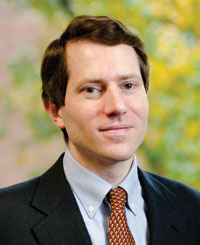 The Financial Reformer
The Financial Reformer
Jeffrey Manns
Associate Professor of Law
On Aug. 9, 2011, The New York Times published Professor Jeffrey Manns' Op-Ed—The Revenge of the Rating Agencies—about the effort by the three leading rating agencies to undercut heightened oversight and regulation under the recently enacted Dodd-Frank financial reform act.
Dr. Manns, who received his doctorate from Oxford University on a Rhodes scholarship, has written about the inherent conflict of interest in debt issuers selecting and paying the parties who rate their credit risk. He has argued that the reluctance to bite the hands that feed on Wall Street led rating agencies to be lax in rating mortgage-backed securities and to be slow in downgrading debt as values tumbled. He proposed shifting from an issuer-pay system to a user-fee system in which an independent or governmental body would choose the ratings agency and impose a user fee on debt issuers.
Ten days after The New York Times published his article, Sen. Al Franken, D-Minn., released his own Op-Ed on CNN, citing Dr. Manns' editorial in support of the abolition of the issuer-pay system. That is the level of influence Dr. Manns wields in the field of financial reform.
Another timely issue the professor has addressed is the financial bailouts. He joined the faculty while the popular backlash to this type of funding was in full swing, which sparked his idea for a long-term investment approach to legitimize emergency interventions. Dr. Manns advocates the federal government's linking future bailouts to long-term equity stakes in beneficiaries, so that once the economy stabilizes, taxpayers share in the returns, rather than allow bankers to profit at the public's expense. He recently presented his research at a conference at the Organization for Economic Cooperation and Development in Paris, which brought together academics and representatives of European central banks to discuss bailouts and the sovereign debt crisis.
In addition to sharing his views with reporters from The New York Times, Wall Street Journal, Chicago Tribune, Bloomberg, and NPR, Professor Manns is actively involved with the GW Center for Law, Economics & Finance. C-LEAF recently hosted its third annual financial reform symposium, featuring former FDIC Commissioner Sheila Bair as its keynote speaker.
"It is a great privilege to be in Washington, D.C., as financial reforms are unfolding, as GW is literally blocks
away from each of the major regulators," says Dr. Manns. "One of the neat aspects of GW is that students can be part of the process, too, in interacting with regulators and practitioners who are working on implementing financial reform and coming to the school frequently as speakers and adjunct professors."
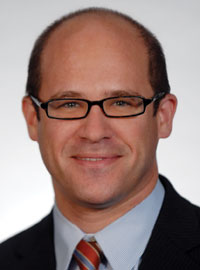 Technology Trailblazer
Technology Trailblazer
Orin S. Kerr
Professor of Law
In addition to serving as an epicenter of global financial regulation, the District of Columbia is the home of the nation's highest court, offering GW Law faculty members a number of unique opportunities. Professor Orin S. Kerr had the privilege in April 2011 of arguing Davis v. United States pro bono before the U.S. Supreme Court to address the scope of the exclusionary rule. In a unique convergence of scholarship and practice, Professor Kerr teaches criminal procedure, is co-author of the leading casebook in criminal procedure (now in its 12th edition), and wrote the briefs in Davis.
"Being at a school that is so engaged with the work of the courts and that cares what the government does makes it easier to focus on its action as an academic," says Professor Kerr, who spent the summers of 2009 and 2010 serving the Senate Judiciary Committee as special counsel. "There are very few law schools where you could have that kind of engagement with the law in many ways so easily."
Prior to joining GW's faculty in 2001, Professor Kerr was an honors program trial attorney in the Computer Crime and Intellectual Property Section of the Criminal Division at the U.S. Department of Justice, as well as a special assistant U.S. attorney for the Eastern District of Virginia. Like Professor Manns, he recently wrote an Op-Ed addressing a critical issue in a computer crime law proposing key amendments. Soon after his article appeared in The Wall Street Journal, Congress presented a bill to enact his suggestions.
In the past year alone, 15 federal court decisions have cited Professor Kerr's law review articles on Fourth Amendment issues related to computer crime. According to the most recent Leiter Rankings, he is ranked number seven among criminal law scholars in the United States for citations in academic journals. In addition, during the week of July 29, 2011, Professor Kerr's "How to Read a Legal Opinion: A Guide for New Law Students" was the top download on the Social Science Research Network (SSRN.com).
His work also has significant practical applications. For instance, in a pending Vermont Supreme Court matter addressing whether judges can place restrictions on the scope of computer warrants and, if so, the types of restrictions they can place, both the plaintiff and defendant in the matter are citing Professor Kerr's arguments in a University of Virginia Law Review article. "It is pretty gratifying when you see that courts can use your scholarship," he says.
As individuals and organizations increasingly rely on computers, technology-related crime issues are becoming only more important, he notes, citing the recent News of the World hacking scandal and the WikiLeaks phenomenon, among others. His upcoming articles address whether computer cases are sufficiently different to justify modified Fourth Amendment rules, and his equilibrium adjustment theory argues that constitutional restrictions should change with technology. Professor Kerr is so well regarded for involving his students in the practical aspects of his work that the GW Law Class of 2009 awarded him the school's Distinguished Faculty Service award.
That component of the law school experience is a unique focus of GW's administration. "We want to encourage our faculty to be both relevant and outspoken," says Professor Bracey, whose opinions are in also in high demand by the media. "It sends a signal to our students that we will teach them how to be engaged with the real world, and how to be constructive and productive to make a difference in real time."

